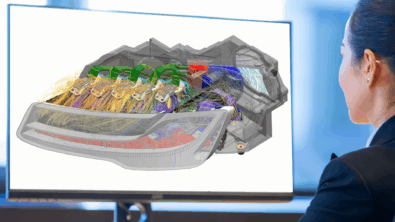Researcher of the Month – Fabio Bianciardi

Siemens PLM Software has international research programs all over the globe. This is how we create new concepts and ideas that become innovative products. It is a great place for researchers and post-grad students to really push their limits in a business environment. Discover what being at Siemens means for Fabio Bianciardi.

 How did you end up at Siemens?
How did you end up at Siemens?
During my last year of university I was informed by my professor of “vibrations and structural dynamics” about the possibility of performing an internship abroad for 6 months aiming at obtaining the Master’s degree. That was the moment in which I heard for the first time about SIEMENS (named “LMS International” at that time). I decided to send my application and after a few weeks I received the good news: I was accepted. It was the 28th of February 2011 when I stepped in the company for the first time. Yes, I still remember that day; it represents a key date in my career life.
 What is your project about?
What is your project about?
I’m involved in different projects related to NVH testing, Transfer Path Analysis and Rotating Machinery. Recently, within the team, we are also exploring innovative methodologies and tools for testing and simulation of downsized ICE powertrains. The development of downsized and eco-efficient powertrains is the general trend in the powertrain industry; in such context we are developing tools to help automotive OEMs to achieve their eco-targets, while maintaining their high levels of performance and high NVH standards. The project involves different aspects of powertrains, from combustion analysis to NVH, and from simulation to testing. This makes project challenging but and the same time it creates the stimulus to investigate and develop innovative methods.
 Why did you choose this area?
Why did you choose this area?
Since I was young I have always been intrigued by any kind of mechanical system, and understanding the technology behind a mechanism was a stimulating challenge for me. The choice of mechanical engineering was mainly driven by this interest. At the university I got courses of mechanics, structural dynamics and combustion analysis and since then my interests translated into passions. By the way, more generally I’ve been always fascinated by research activities.

 What is the craziest thing you have ever done as an engineer? (Keep it professional, please)
What is the craziest thing you have ever done as an engineer? (Keep it professional, please)
When thinking about crazy… mmm… what comes to my mind are all the work marathons that we normally do when a validation test campaign of innovative methods needs to be performed. During a test campaign many things could go wrong and Murphy’s Law is always present.
 What is the best thing about your research projects?
What is the best thing about your research projects?
Not an easy question… there are many good things about my research projects. However, if I have to choose the best thing I would say: the approach that we have in developing new methodologies, starting from numerical simulation up to the final industrial experimental validation. Verifying the developed solutions on real application cases represents an excellent reward at the end of each project. This allows us to sometimes get in contact with the major leaders of the automotive market as well as of the aerospace industry, which are the end-users of the tools implemented in the software.
 What is the worst thing?
What is the worst thing?
I would say the administrative and bureaucratic part of the project is for sure way less exciting than technical challenges of the project.
 Do you think your work will really make a difference?
Do you think your work will really make a difference?
I believe it will make clearly a difference for Siemens, opening market opportunities and possible collaborations and synergies to get to the solution to the market in an efficient way.
 25 years from now, there will be: likely there will be a revolution in the car manufacturing paradigm. The need for greener vehicles will bring science to discover new materials and emerging alternative fuels will probably be the new state-of-the-art for powering of vehicles.
25 years from now, there will be: likely there will be a revolution in the car manufacturing paradigm. The need for greener vehicles will bring science to discover new materials and emerging alternative fuels will probably be the new state-of-the-art for powering of vehicles.
What would you do differently, if you could?
I would give to the innovative ideas the necessary agility to be implemented into the software.
If you weren’t an engineer, what would you be?
One of my other passions is being involved in Emergency Medical rescue activities. I always wanted to learn what to do in an emergency situation when few minutes can make a difference. During my studies I enrolled in courses at the Italian Red Cross to become first aid rescuer, and, as a volunteer, I weekly performed first aid emergency activities. So, if I could go back in time, I would probably study medicine.
 Will engineering change the world?
Will engineering change the world?
Definitely yes! And more specifically I believe that any scientific research in any field will shape the world in a better way.


